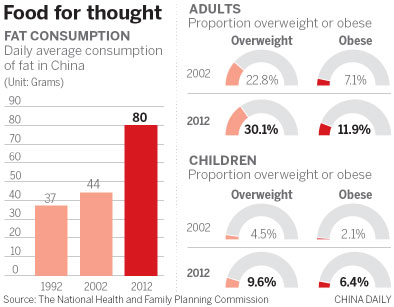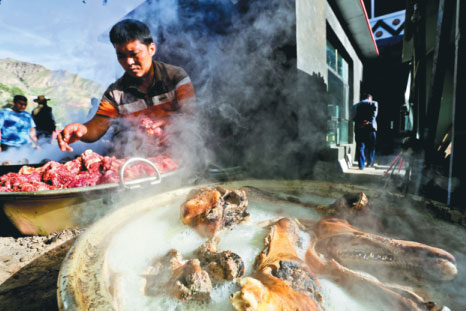Consumers have no beef with meat
Updated: 2016-01-08 07:56
By Shan Juan(China Daily)
|
|||||||||||
|
|
Dietary changes
Chen Chunming, a nutritionist in Beijing, said Chinese academics noticed noticeable change in the national diet - increased consumption of protein, mainly by eating meat - in the wake of World War II. However, the trend accelerated as a result of the reform and open-up policy in the late 1970s.
Government statistics show that before the war, the Chinese diet was 98 percent plant-based, and meat was used sparingly, mainly as a form of flavoring.
Official statistics show that in 2012, annual meat consumption averaged nearly 63 kg per person, compared with 12.7 kg in 1980.
Pork accounts for the lion's share of sales, but consumption of "healthier" white meats, such as poultry, has also increased steadily.
"Meat consumption continues to show an upward trend," Chen said, although he added that the figures in China are lower than in the US where each person eats an average 106 kg of meat every year.
Now, not only is the consumption of meat a fact of daily life, but Chinese people are eating it in larger quantities, according to Wang Xinpeng, a beef salesman at a supermarket in Beijing's Chaoyang district, who said 150-gram flavored steaks are becoming increasingly popular with his customers.
"Such a large amount of meat at each serving isn't my thing, but the Chinese, particularly younger people, eat meat a different way now," he said, adding that some of his regular customers eat steak for breakfast every other day. "They really are meat lovers," he said.
Demand set to soar
China's meat industry is now preparing for even higher demand in the years to come, especially after changes to the national family planning policy that will allow most couples to have two children rather than one.
This year will see the completion of the world's largest animal cloning facility, in the Northern port city of Tianjin, where beef and dairy cattle will be cloned for food production and also to improve livestock strains.
Xu Xiaochun, chairman of the Boyalife Group in Jiangsu province, the country's only commercial provider of cloned animals, said the Chinese market for cloned beef has huge potential because there has been a shortage for several years.
The rise in the consumption of meat in China echoes findings by statisticians that dietary habits change as a society becomes more prosperous, more specifically, rising prosperity results in increased consumption of protein, primarily from meat.
Max Rubner, an academic and researcher in the US in the early part of the last century, believed that high protein consumption was a sign of civilization and the right of civilized people. Elitism and arrogance dominated much of the burgeoning field of nutrition in the 19th century, and the "lower classes" were considered lazy or inept as a result of not eating enough meat or protein.
Rubner's argument was partially endorsed by T. Colin Campbell, the Jacob Gould Schurman Professor Emeritus of Nutritional Biochemistry at Cornell University. In his bestselling book The China Study, Campbell concluded that a cultural bias had become firmly entrenched: civilized people ate proteins; wealthy people ate meat; and the poor ate staple foods, such as potatoes and bread. "These changing dietary habits are in tandem with the increasing GDP," he said.
However, he also said the concept that bigger is better, more civilized and perhaps even more spiritual, was not only incorrect, but also harmful.
The incidence of heart disease, strokes and certain cancers began to rise with the high-protein diet, particularly animal fats, and China should be fully aware of the situation and take preemptive measures, according to Clarke.
With the increased consumption of meat, usually coupled with the increased intake of refined carbohydrates and high-calorie foods, the mortality rates from infections and malnutrition decreased dramatically, but that good news is offset by the fact that the number of deaths from heart attacks, strokes and cancers began rising, he said.

Today's Top News
Going mobile
Man with knife shot dead outside Paris police station
Trading halted after shares fall 7% in opening minutes
China voices its 'resolute opposition' to DPRK test
Design exhibition to attract Chinese art works
Germans shaken by mass attacks on women
Concerns grow over Saudi-Iranian rising tensions
Obama tightens gun rules, requires background check
Hot Topics
Lunar probe , China growth forecasts, Emission rules get tougher, China seen through 'colored lens', International board,
Editor's Picks

|

|

|

|

|

|







